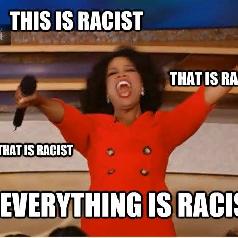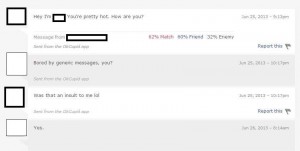This guest post comes by way of “Nate,” an all-around thoughtful person with a unique perspective on male-female dating: he went from not having to reject women much to a situation where it was a more common occurrence for him. Here, he shares what he has learned.
I’m a male atheist who’s active in the movement, and a regular reader of Heina’s posts. I am also in an open/polyamorous marriage. I’d happily identify myself, but due mainly to prickly in-laws, I don’t generally talk about the poly aspects of my life in public.
After reading Heina’s recent post, “I’ll Stop Citing a Boyfriend When My Consent Starts Mattering,” I’d like to offer some additional perspective to men who are frustrated when they are silently rejected. Turning down an interested suitor directly can be awkward for anyone, male or female. However, we men generally have to do it much less frequently. When I was a teenager, I used to say the same thing guys say in that post: A girl I like should just tell me if she’s not interested. It’s inconsiderate to give people the brush off.
Having transitioned to poly, I now wind up meeting and spending time with a much higher volume of people. Women in the poly community are often more forward than single young women, and, sometimes, our interest levels simply do not match. When I’m the one who is not interested, it becomes really clear how difficult the “reject me to my face” standard is to live up to.
The problem is that if you take the time to say “I’m not interested in you,” it invites the other person to argue about why they deserve your attention. But since the point of rejecting somebody is to excuse yourself from giving that attention in the first place, being drawn into a discussion about it achieves the exact opposite of what you’re trying to do. Yes, it’s more convenient from the dumpee’s perspective to understand why they were dumped, but an explanation is still an imposition on the dumper’s time and energy. It is nice if they can offer that feedback, but it isn’t their responsibility.
With the shoe on the other foot, it is much easier for me to understand why sometimes, women just don’t respond to my messages. Even after becoming poly, I’ve occasionally been on the receiving end of a slow disappearing act from someone I liked. That still sucks, and it’s always disappointing. Now, though, I understand a lot better that I am not entitled to an explanation when somebody does not want to talk to me.
That probably is where a gender imbalance can occur, because while it is uncomfortable to reject somebody no matter who you are, in most cases, men are much more likely to expect entitlements than women are. Also, of course, I rarely feel physically endangered when I am the dumper.
Men, if you get rejected, you are totally entitled to do all the standard stuff. Complain about it in manly ways at your friends. Eat a big old pile of smoked barbecue. Lock yourself in your room and play Team Fortress for 48 hours straight. But I’m begging you: keep your dignity and don’t assume that you are entitled to an explanation of your shortcomings.




